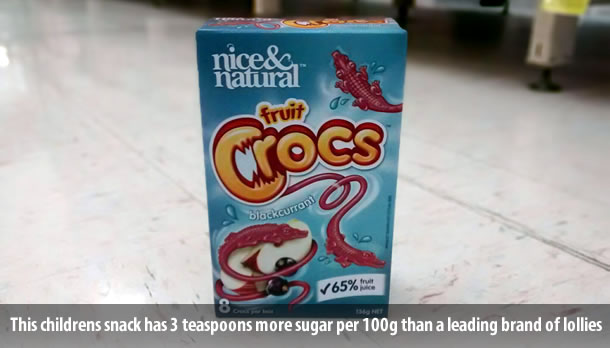It started with Roll Ups promoting themselves as a way to give kids their daily servings of fruit.
This plasticky fruit leather was no doubt a dentist’s nightmare. But things appear to have got worse.
In the muesli bar section of my local supermarket I found these nice & natural fruit Crocs aimed as easy snacks for kids’ lunch boxes.
These “Fruit Crocs”, along with Roll ups and even Cadbury’s “Natural Confectionary Company” all ride on the coat tails of fruit’s health halo.
People seem to think that because fruit is good for you, the sugar from its juice will somehow be better than that from refined sugar.
Sorry, but sugar is natural too – the problem is that it is refined and processed, just like the fruit juice in these products.
But the galling thing about these Fruit Crocs is that they are individually wrapped and put beside muesli bars to fool time-pressed parents into thinking they are good lunch box fillers.
Let’s compare the nutrition information between these and a packet of Dinosaurs from the Natural Confectionary Company.
“Fruit Crocs” have more sugar (an extra 11.3 g or 3 teaspoons per 100g), almost twice the salt and apart from a little more protein it appears there is nothing different to the lollies.
Which is exactly what these “Fruit Crocs” are.
Now, let’s ignore for the moment that there are a multitude of sins masquerading as healthy food in the muesli bar aisle.
Most muesli bars are not quite this bad – “Fruit Crocs” are clearly out of place in this aisle.
So whose role is it to ensure that busy parents don’t get fooled into thinking that these are acceptable snacks for their kids’ lunch boxes?
Supermarkets determine where products are placed, but of course their interest is solely in selling us more stuff, not making sure we are informed consumers.
A number of schools ban lollies, but it is pretty hard to police if these types of things are being marketed as healthy snacks to unsuspecting parents.
The only way to overcome this appalling misleading advertising is to make it easy and accessible for people to understand the nutritional value of what they are buying.
The Government’s new food labeling guidelines will hopefully be a step towards this; hopefully the star ratings on the front of packets will make it glaringly obvious that these items (I hesitate to call them food) are not a suitable everyday food.
Trouble is that these labels are voluntary – either the Government needs to get some spine and make these labels compulsory, or supermarkets need to make them a condition for being stocked on shelves.
New World, Pak n Save, 4 Square, Countdown: Who will step up?
If you think front of package food labeling should be compulsory in New Zealand, sign our petition.
What #fakefood marketing tactics have shocked you? Take photos and share them with us on twitter or Facebook.

